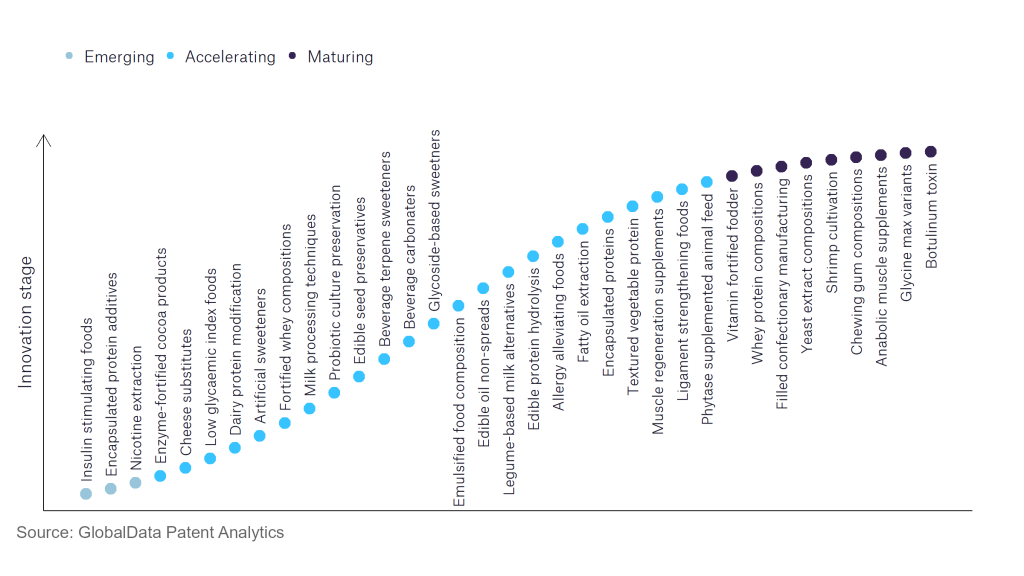The consumerindustry continues to be a hotbed of innovation, with activity driven by health and wellness, convenience, aesthetics, as well as the growing importance of digital food management, personalised nutrition, and food safety and transparency. In the last three years alone, there have been over 450,000 patents filed and granted in the consumer industry, according to GlobalData’s report on Innovation in Consumer: Beverage terpene sweeteners. Buy the report here.

Discover B2B Marketing That Performs
Combine business intelligence and editorial excellence to reach engaged professionals across 36 leading media platforms.
However, not all innovations are equal and nor do they follow a constant upward trend. Instead, their evolution takes the form of an S-shaped curve that reflects their typical lifecycle from early emergence to accelerating adoption, before finally stabilising and reaching maturity.
Identifying where a particular innovation is on this journey, especially those that are in the emerging and accelerating stages, is essential for understanding their current level of adoption and the likely future trajectory and impact they will have.
40+ innovations will shape the consumer industry
According to GlobalData’s Technology Foresights, which plots the S-curve for the consumer industry using innovation intensity models built on over 110,000 patents, there are 40+ innovation areas that will shape the future of the industry.
Within the emerging innovation stage, hydrogel dressings, dextrin-based compositions, and safety injection needles are disruptive technologies that are in the early stages of application and should be tracked closely. Artificial sweeteners, cheese substitutes, and beverage carbonates are some of the accelerating innovation areas, where adoption has been steadily increasing. Among maturing innovation areas are chewing gum compositions and anabolic muscle supplements, which are now well established in the industry.
Innovation S-curve for the consumer industry

Beverage terpene sweeteners is a key innovation area in consumer
With the current focus on sugar reduction and putting calories on menus, there are lots of opportunities for the commercial application of terpene sweeteners in soft drinks.
GlobalData’s analysis also uncovers the companies at the forefront of each innovation area and assesses the potential reach and impact of their patenting activity across different applications and geographies. According to GlobalData, there are 10+ companies, spanning technology vendors, established consumer companies, and up-and-coming start-ups engaged in the development and application of beverage terpene sweeteners.
Key players in beverage terpene sweeteners – a disruptive innovation in the consumer industry
With current focus on sugar reduction and putting calories on menus, there are lots of opportunities for the commercial application of terpene sweeteners in soft drinks.
‘Application diversity’ measures the number of different applications identified for each relevant patent and broadly splits companies into either ‘niche’ or ‘diversified’ innovators.
‘Geographic reach’ refers to the number of different countries each relevant patent is registered in and reflects the breadth of geographic application intended, ranging from ‘global’ to ‘local’.
Patent volumes related to beverage terpene sweeteners
| Company | Total patents (2021 - 2023) | Premium intelligence on the world's largest companies |
| Ingredion | 323 | Unlock Company Profile |
| Cargill | 159 | Unlock Company Profile |
| Conagen | 156 | Unlock Company Profile |
| Royal DSM | 63 | Unlock Company Profile |
| PepsiCo | 33 | Unlock Company Profile |
| Evolva Holding | 21 | Unlock Company Profile |
| Zhucheng Haotian Pharm | 15 | Unlock Company Profile |
| Tate & Lyle | 10 | Unlock Company Profile |
| Evolva Nutrition | 10 | Unlock Company Profile |
| Firmenich International | 6 | Unlock Company Profile |
| Thermo Fisher Scientific | 6 | Unlock Company Profile |
Source: GlobalData Patent Analytics
Ingredion is one of the leading patent filers in beverage terpene sweeteners. Some other key patent filers in this field include Cargill, Conagen, Royal DSM, and PepsiCo. Recently, the new sweetener system from Cargill’s EverSweet + ClearFlo platform combines a natural flavour with the company's stevia sweetener to offer advantages such as flavour modification, improved solubility and stability in formulations, and quicker dissolution. EverSweet + ClearFlo builds on the rapid sweetness onset and high sweetness intensity of EverSweet to further enhance the sugar-like feeling, especially at higher dosages. This novel sweetening technique also aids in controlling off-flavours from other components, such as bitter notes from caffeine, earthy notes from proteins, or metallic tastes from potassium chloride.
In terms of application diversity, Evolva Holding leads the pack, with Evolva Nutrition and Royal DSM in the second and third positions, respectively. By means of geographic reach, Evolva Nutrition holds the top position, followed by Cargill and Evolva Holding.
Customers are even more willing to purchase foods that are made with all-natural components and have unblemished labelling along with other useful qualities. Alternative natural sweeteners, such as high-fructose corn syrup, sugar alcohols (polyols), as well as steviol glycosides, tagatose and thaumatin that provide consumers with additional health advantages, are now available in the food sector to meet changing consumer preferences.
To further understand the key themes and technologies disrupting the consumer industry, access GlobalData’s latest thematic research report on Consumer.
Data Insights
From

The gold standard of business intelligence.
Blending expert knowledge with cutting-edge technology, GlobalData’s unrivalled proprietary data will enable you to decode what’s happening in your market. You can make better informed decisions and gain a future-proof advantage over your competitors.




